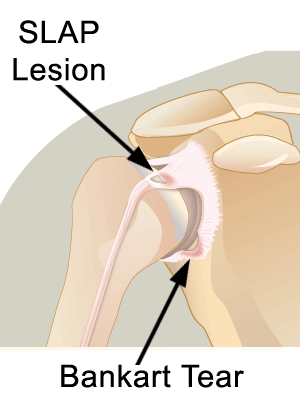Medical Library
Pick a Body Area
Labral Tears

The labrum is a cartilage ring that surrounds the shoulder socket (called the glenoid) and makes it deeper. In the above picture, it is numbered "5" - the thin blue ring around the glenoid. Since the socket is deepened by the labrum, the ball of the arm bone (called the head of the humerus) has a better fit into it. Labrum or labral tears are usually associated with trauma, instability of the shoulder, or repetitive throwing as with a baseball player.
The signs and symptoms of a labral tear are painful clicking, locking, or popping. Instability may be present because the labrum is not doing its job of holding the ball in the socket. Medical intervention for a labral tear typically involves an MRI for diagnosis and arthroscopic repair but labral tears are often hard to diagnose. A special kind of labral tear, a superior labral anterior to posterior (SLAP) tear, often involves the biceps tendon as well.
Possible Treatments
Possible Treatment Goals
- Improve Function
- Improve Muscle Strength and Power
- Increase Oxygen to Tissues
- Improve Proprioception
- Improve Range of Motion
- Self-care of Symptoms
Additional Resources
Disclaimer
The information in this medical library is intended for informational and educational purposes only and in no way should be taken to be the provision or practice of physical therapy, medical, or professional healthcare advice or services. The information should not be considered complete or exhaustive and should not be used for diagnostic or treatment purposes without first consulting with your physical therapist, occupational therapist, physician or other healthcare provider. The owners of this website accept no responsibility for the misuse of information contained within this website.

